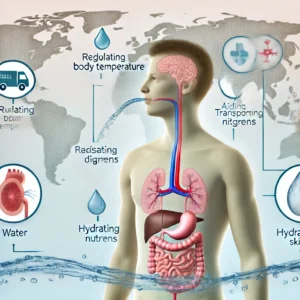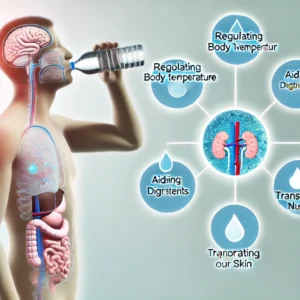The Importance of Hydration: How Water Impacts Your Health


Water is the essence of life. It plays a critical role in almost every major bodily function, yet many people still overlook the importance of staying properly hydrated. Whether you’re an athlete, a busy professional, or just someone looking to improve their overall health, understanding the significance of hydration is key to maintaining your well-being. In this blog, we will explore how water impacts your body, why hydration is essential, and how much water you really need.
1. The Role of Water in Your Body
Water makes up approximately 60% of the human body, underscoring its importance for survival. It serves a variety of vital functions, including:
- Regulating Body Temperature: Water helps your body cool down when it gets too hot through the process of sweating. Evaporation of sweat from the skin helps maintain your body’s internal temperature within a healthy range.
- Transporting Nutrients and Oxygen: Water acts as a medium to deliver nutrients and oxygen to cells. It also aids in the absorption of these nutrients from the digestive system.
- Supporting Digestion: Water is necessary for the digestive system to function properly, helping break down food and absorb nutrients.
- Removing Waste: Your kidneys rely on water to filter out toxins and waste products from your blood, which are then excreted through urine. Proper hydration prevents kidney stones and urinary tract infections.
- Lubricating Joints: The synovial fluid that cushions and lubricates your joints is made up largely of water. This prevents friction between bones and helps maintain joint health.
2. How Dehydration Affects Your Body
Even mild dehydration can have negative effects on your body. Some of the consequences include:
- Fatigue and Low Energy: Dehydration reduces blood volume, which causes your heart to work harder to deliver oxygen and nutrients to your cells. This can leave you feeling tired and sluggish.
- Headaches: Lack of proper hydration can trigger headaches, including migraines, due to the reduced flow of blood and oxygen to the brain.
- Poor Cognitive Function: Dehydration affects concentration, memory, and mental clarity. Even slight water deficits can impair your focus and performance.
- Constipation: Insufficient water intake can lead to constipation, as water is needed to soften stool and move waste through the intestines.
- Dry Skin and Irritation: Water keeps your skin hydrated and plump. Dehydration may result in dry, flaky skin and exacerbate conditions like eczema.
3. How Much Water Should You Drink?
The amount of water you need depends on various factors such as your age, weight, activity level, and environment. A commonly recommended guideline is to drink about 8 cups (64 ounces) of water a day, though individual needs may vary. Other factors to consider:
- Exercise: If you’re physically active, you’ll need more water to replace fluids lost through sweat. Athletes may require more, depending on the intensity and duration of the exercise.
- Climate: If you live in a hot or humid environment, your body will lose more water, and you’ll need to increase your intake.
- Health Conditions: Certain conditions, such as fever, diarrhea, or vomiting, can increase your water needs. Pregnant and breastfeeding women also require more water to stay properly hydrated.
4. Signs of Dehydration to Watch For
It’s essential to listen to your body and recognize the signs of dehydration before it becomes severe. Common symptoms include:
- Dark yellow urine
- Dry mouth or throat
- Dizziness or lightheadedness
- Muscle cramps
- Fatigue
- Irritability
Drinking water regularly throughout the day, especially when you’re active, is the best way to prevent dehydration.
5. Tips to Stay Hydrated
- Carry a Water Bottle: Always have water with you, whether at work, the gym, or while traveling. This encourages regular sips throughout the day.
- Infuse Water with Flavor: If plain water feels boring, try adding slices of lemon, cucumber, or berries to enhance the taste naturally.
- Eat Hydrating Foods: Many fruits and vegetables, like watermelon, cucumber, and oranges, have high water content and contribute to hydration.
- Set Reminders: Use an app or set alarms on your phone to remind you to drink water regularly.
- Drink Before You’re Thirsty: Thirst is an indicator that you’re already mildly dehydrated. Make it a habit to drink water before you feel thirsty.
Conclusion
Hydration is a fundamental aspect of maintaining good health, from regulating body temperature to improving cognitive function. By staying properly hydrated, you can boost your energy levels, enhance digestion, support your skin health, and even improve your mood. So, grab that water bottle and make hydration a priority in your daily routine—it’s one of the simplest and most effective ways to keep your body functioning at its best.
Stay hydrated, stay healthy!
